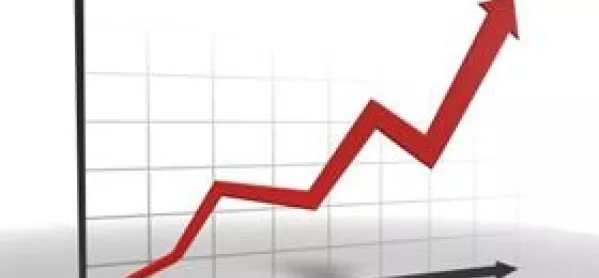The GCSE pass rate has risen for the 24th year in a row, with A and A* grades climbing to a new high of 23.2 per cent.
This year’s results, released yesterday, also saw the gender gap widen further, with girls achieving record leads over boys at both A* and AA* (see box).
There were big boosts in entries for physics, chemistry and biology, but a notable acceleration in the alarming decline of modern foreign languages.
Overall, nearly seven out of 10 entries gained at least a grade C. The proportion of A* grades crept up to 7.8 per cent.
Association of School and College Leaders general secretary Brian Lightman said: “We are delighted this has reflected the hard work of students who are more aware than ever of the pressures they now face.”
There was a large increase in pupils taking their English GCSE early in the winter, up more than a third this academic year.
It was offset by a fall in summer entries in the subject, but figures suggest a significant number of winter candidates re-sat later in the year.
Mary Bousted, general secretary of teaching union the ATL, welcomed the overall “great results” but warned that this cohort would be the last to have a “real choice of subjects”.
“Education secretary Michael Gove’s English Baccalaureate is likely to restrict the range of subjects taught to GCSE,” she said. “This risks demotivating and alienating the thousands of young people who struggle with academic subjects.”
The EBac requires pupils to get GCSE grade C passes or better in a language, maths, English, two sciences, and history or geography.
Think-tank Civitas this week predicted the performance measure would lead to less able pupils being excluded from EBac subjects, because teachers would be under pressure to devote their attention to pupils most likely to achieve a C.
But the plight of languages suggests it is too early for the EBac - announced when this year’s candidates were halfway through their courses - to have had an impact on entries.
French - which last year dropped out of the top 10 most popular subjects for the first time - saw the speed of its decline more than double. In German it nearly tripled, and Spanish GCSE entries fell for the first time since 2006.
RE, controversially excluded from the EBac, saw an extra 33,270 entries, a 17.63 per cent increase that was the highest among subjects with at least 100,000 entries. Entries in history and geography both fell slightly.
The headline rises in results masked drops in performance in some subjects. The proportion of A* grades fell in subjects including business studies, French, geography and German. And A*-C pass rate falls included design technology, chemistry, music, and art and design.
Northern Ireland continued to outperform the other two nations at A*, A*A and A*-C, but saw its lead over second-place England on the top grades narrow. Wales continued to bring up the rear at all three levels.
A Department for Education spokesman said: “The EBac is not compulsory and is only one measure of success - pupils should study what is right for them. It makes up just five subjects, three of which are compulsory anyway.”
By the numbers: Highs and lows
Last year’s figure in brackets.
- Percentage of entries gaining A* 7.8 (7.5), A*-A 23.2 (22.6), A*-C 69.8 (69), A*-G 98.8 (98.7).
- Separate sciences entries up by 16.4 (32) per cent in physics, 16.2 (32) in chemistry and 14.2 (28) in biology.
- Language entries down by -13.2 (-5.9) per cent in French, -13.2 (-4.5) in German and -2.5 (+0.9) in Spanish.
Original headline: Pass rate for GCSEs climbs for 24th year but union warns it’s the end of choice




